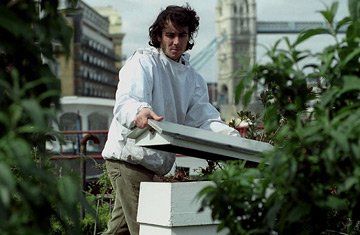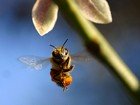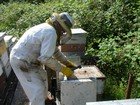Urban Beekeeping in
Towns and Cities
You wouldn't expect a guy wearing muddy boots and worn moleskin pants to saunter past the formally dressed footmen at London's Fortnum & Mason, the famous Piccadilly food emporium that's a favorite of the British royals.
But Steve Benbow, 38, is not your average fancy-food consumer. He is one of many urban beekeepers, in the British capital, and although he usually enters Fortnum's by the staff door and heads to the roof, where he oversees four beehives, some days he can't resist stopping on the grand ground floor for the thrill of seeing his name on one of the store's posh products.
 Come
spring, when Benbow's bee hives
return
to the roof after a yearlong renovation at Fortnum's, hundreds of
thousands of his honeybees will be buzzing over to Buckingham Palace,
specifically its 42-acre (17 hectare) private garden, the source of
pollen and nectar for their very fine honey.
Come
spring, when Benbow's bee hives
return
to the roof after a yearlong renovation at Fortnum's, hundreds of
thousands of his honeybees will be buzzing over to Buckingham Palace,
specifically its 42-acre (17 hectare) private garden, the source of
pollen and nectar for their very fine honey.
Fortnum and Mason's beekeeper Steve Benbow tends to his beehives near Tower Bridge in the City of London. Picture by Steve J. Benbow
For the aficionado, city honey is purer, according to Benbow, because in the country you have oilseed rape, genetically modified crops, pesticides and fertilizers, whereas traffic pollution doesn't seem to affect bees.
City bees are more productive: ample food plus warmer temperatures mean they yield up to three times as much honey as their country cousins, according to the British Beekeepers Association.
"London's a delight for a bee, because there are so many flowering plants and trees," says Benbow, who describes the taste of the honey he collects from 17 other hives he has hidden on London rooftops as similar to floral toffee. While beekeeper numbers are hard to gauge, Benbow estimates there are several hundred urban beekeeping sites in inner London.
Cities need bees for pollination as well as honey, but honeybees now particularly need city folk for their window boxes and gardens. In the country, their numbers are in steep decline, in part because of intensive farming and the loss of hedgerows. But what of their sting?
"The worst-tempered bees I know are those kept on the heather in Wales," says Benbow. "My London honeybees are a gentler breed." That said, Benbow keeps his hives high, so that the bees head out from them way above people's heads before dropping down to forage.
That might be cold comfort if your knowledge of bees is based more on the 1978 movie The Swarm than on this season's box-office honeypot Bee Movie. "My job is to make sure swarming doesn't happen," says Benbow, who monitors his London hives weekly during the high season.
Keeping city bees safely is an art that the French teach right in central Paris in a rucher ecole (hive school) next to an apiary established in the Luxembourg Gardens in 1856 that houses about a million bees. Urban beekeeping in Paris is, well, a hive of activity, with colonies living on private balconies, at an inner-city nunnery and, famously, atop both the Opera Bastille and the Palais Garnier, the latter still tended by Jean Paucton, 73.
Paucton's bees forage in the Tuileries Gardens, the chestnut trees of the Champs-Elysees and the linden trees of the Palais Royal. The honey they produce sells at a premium price at Fauchon.
While urban beekeeping is buzzing in Europe and the U.S.--San Francisco is full of busy bees, and Chicago's green-roof program provides ideal space for hives--it is illegal in Manhattan, where honeybees fall under an ordinance that forbids keeping animals that are "wild, ferocious, fierce, dangerous or naturally inclined to do harm."
The solution, it seems, is to put hives up high, where they will be undetected and give the bees easy access to rooftop gardens. David Graves, 57, who has hives on the Upper West Side, in Harlem and on a 12-story hotel in the East Village, says he's never been bothered by the city, "although if a neighbor didn't like bees, I'd give them a jar of honey and move to another roof."
Where to find the best urban honey in three cities?
* Fortnum's Bees Superior Honey at Fortnum and Masons
* Miel recolte sur les toits de l'Opera de Paris (honey harvested on the rooftops of the Paris Opera): A limited supply is available at Fauchon's Place de la Madeleine store
* David Graves' Rooftop Magic NYC honey Sold at the Berkshire Berries stand at New York City's Union Square Greenmarket on Monday, Wednesday and Saturday, or visit Berkshire Berries
Written by: Marion Hume
Wednesday, Nov. 21, 2007
Time MagazineSo if you live in the city, why don't you thing about urban beekeeping? It is one step closer to living the country life and being self-sufficient! Honey is extremely good for you and there are lots of benefits of honey. Keeping bees is one way of getting a steady supply of this whole food.
If you do decide to keep bees you should also know what honey plants you should plant for your bees to make that delicious honey.Do you Keep Bees in your Backyards in the Suburbs or in the City? Tell us about your Urban Beekeeping Experiences.
Leave a Comment
Do you have anything that you would like to add after reading this page? We would love to hear your thoughts. If you can add additional information to what has been written here you will be adding value to the website! No need to have any special skills - just type and submit. We will do the rest!











New! Comments
Do you have something of value to add? Leave me a comment in the box below.